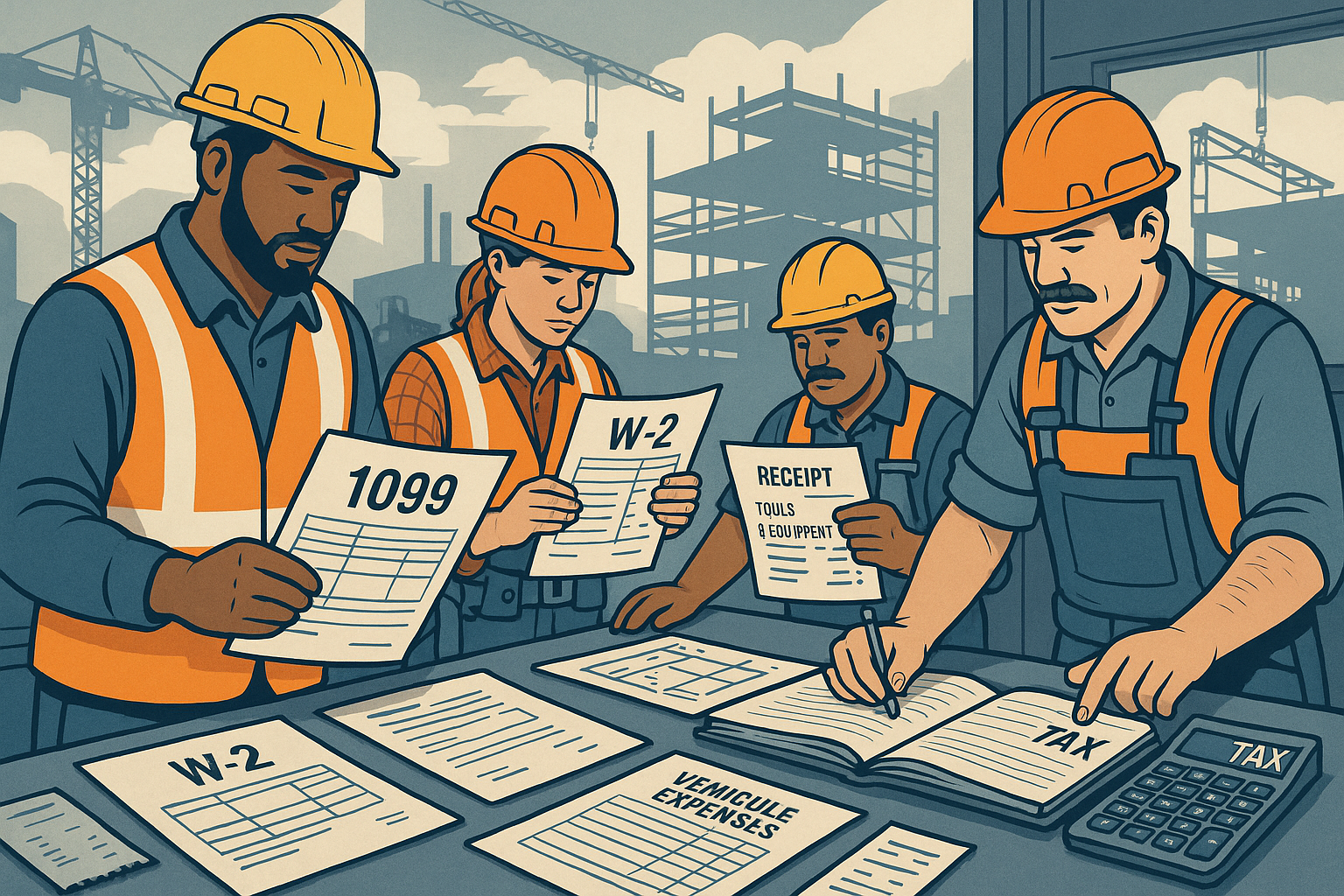
Construction workers often struggle with taxes because payment methods differ from traditional jobs. Many receive 1099 forms instead of W-2s. Independent contractors must manage their own tax withholdings and quarterly estimated payments. Without preparation, these obligations can quickly overwhelm even experienced professionals.
The IRS closely monitors the construction industry because of frequent cash transactions and worker misclassification. Auditors know contractors often fail to report income accurately. Missteps in income reporting raise red flags for federal and state authorities. Proper documentation and consistent record-keeping help reduce these risks significantly.
When workers ignore income tax responsibilities, penalties and enforcement actions follow quickly. Late payments create costly interest charges and mounting debt. Wage garnishments or liens can severely disrupt financial stability. Filing taxes correctly and on time protects income, prevents penalties, and supports long-term financial security.
Understanding construction workers' taxes requires knowing how income is classified, reported, and managed throughout each tax year.
Understanding your tax return requirements can result in unexpected tax bills, audits, or penalties. Proper planning ensures construction workers and business owners can pay taxes accurately, claim deductions correctly, and maintain financial stability.
Understanding the different types of construction workers' taxes is essential because each role in the construction industry carries unique tax responsibilities.
By understanding these tax categories, construction workers and contractors can better manage filing taxes, claim deductions properly, and avoid costly mistakes while meeting their tax obligations.
Addressing construction workers' taxes protects you from immediate threats like IRS and state enforcement actions. Agencies track the construction industry closely. Workers who ignore filing obligations face liens, wage garnishments, and property seizures. Taking responsibility ensures you avoid unnecessary legal or financial battles.
Proper tax compliance also reduces the risk of penalties and large income tax bills. Workers who miss quarterly estimated tax payments often accumulate interest. Filing correctly helps maximize common tax deductions for vehicles, tools, and home office expenses. These savings directly reduce your total taxable income and protect long-term stability.
Meeting tax obligations builds professional credibility for construction contractors and small business owners. Banks often require compliant tax returns to approve loans or mortgages. Clear records prove that you can manage business income responsibly. Filing on time secures financial opportunities and strengthens trust with lenders and clients.
Managing construction workers' taxes can feel overwhelming, but a clear process makes compliance easier for workers and contractors.
This process allows construction workers and contractors to reduce stress, avoid errors, and confidently meet their tax obligations each season.
Construction workers pay different taxes depending on their classification. Employees usually have income tax, social security tax, and Medicare taxes automatically withheld. Independent contractors and self-employed workers must pay income and self-employment taxes and often make quarterly estimated tax payments. Business owners in the construction industry also manage employment taxes, sales taxes, and possible property taxes. Failing to pay on time can lead to penalties, interest, and IRS or state enforcement actions.
An independent contractor in the construction industry generally controls their work, provides tools, and works with multiple clients. They are not managed like traditional employees and do not have taxes automatically deducted from pay. Instead, they handle their own taxes, pay self-employment tax, and report all business income. If a worker is misclassified as an independent contractor, the construction company or contractor hiring them could face audits, penalties, or back payment obligations under federal and state tax laws.
The time needed to file your taxes depends on your role and record-keeping. Employees with tax forms like W-2s can often finish within a few hours. Independent contractors and self-employed workers may take longer, especially if they must organize detailed records of business expenses, vehicle expenses, or home office deductions. Filing past-due returns or addressing audits for construction contractors can take weeks or months, depending on complexity, IRS backlog, and whether professional guidance is required.
Construction workers' taxes include valuable tax deductions to reduce taxable income. Common tax deductions include business travel, vehicle expenses, truck expenses, parking fees, and meal costs while working away from home. Many also deduct home office expenses, supplies, marketing, and professional service fees. Health insurance premiums, rent or mortgage interest, and property taxes can also be tax-deductible. To maximize benefits, workers should track expenses and claim deductions using Schedule C or other required IRS tax forms.
Yes, both individuals and construction businesses can get tax assistance. Self-employed workers, independent contractors, and employees with complex situations often need help understanding tax obligations and laws. Likewise, a construction company or business owner must manage payroll, issue tax forms, and handle business assets and associated expenses. Professional assistance ensures compliance, prevents costly mistakes, and identifies opportunities to claim deductions. Whether filing a personal tax return or managing a company’s tax responsibilities, expert support provides clarity and reduces stress during tax season.
Construction workers face strict tax obligations, and unresolved issues can quickly become serious financial threats. Many workers miscalculate income tax or overlook self-employment tax, leading to unexpected penalties. These mistakes can place their finances and even their business licenses at risk. Acting now prevents growing debt, wage garnishments, and IRS enforcement.
Get professional guidance by requesting a free case review through Get Tax Relief Now. The process is 100% confidential and built for the construction industry. Independent contractors, employees, and construction contractors can all benefit from tailored support. A personalized plan ensures you file your taxes correctly, resolve existing problems, and secure your financial future.
Methods of Contact
Vital for collaboration, support, or information exchange.